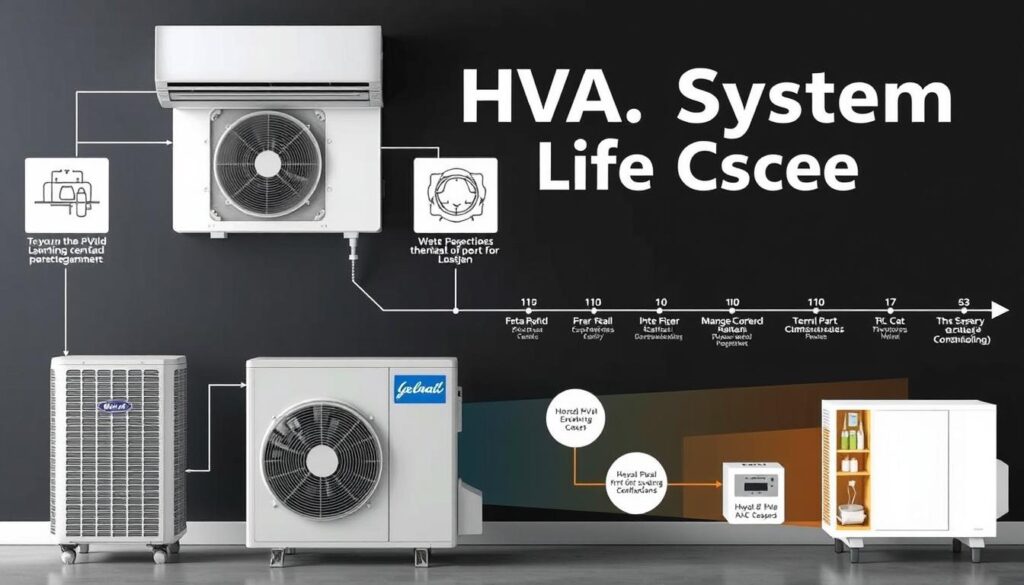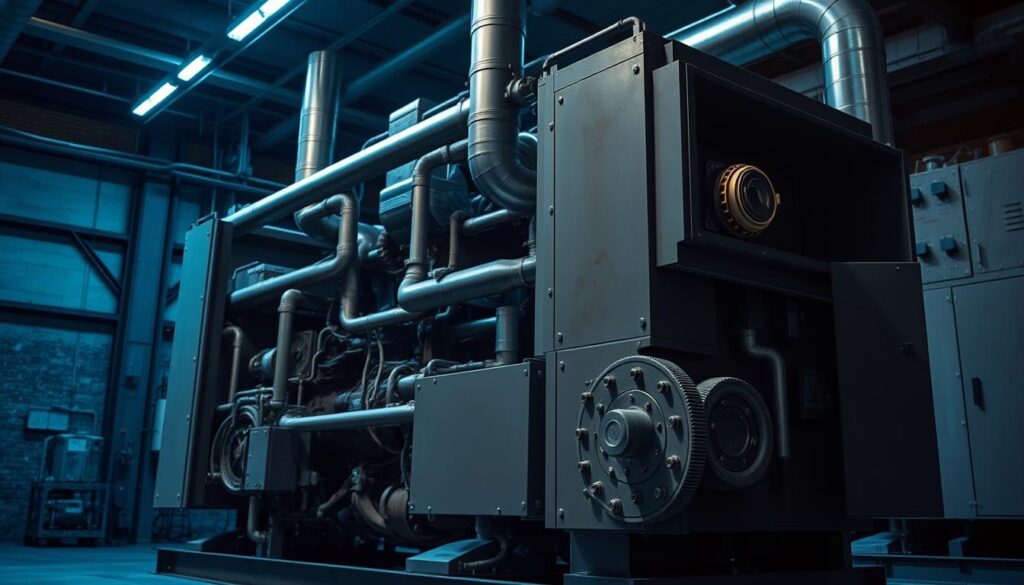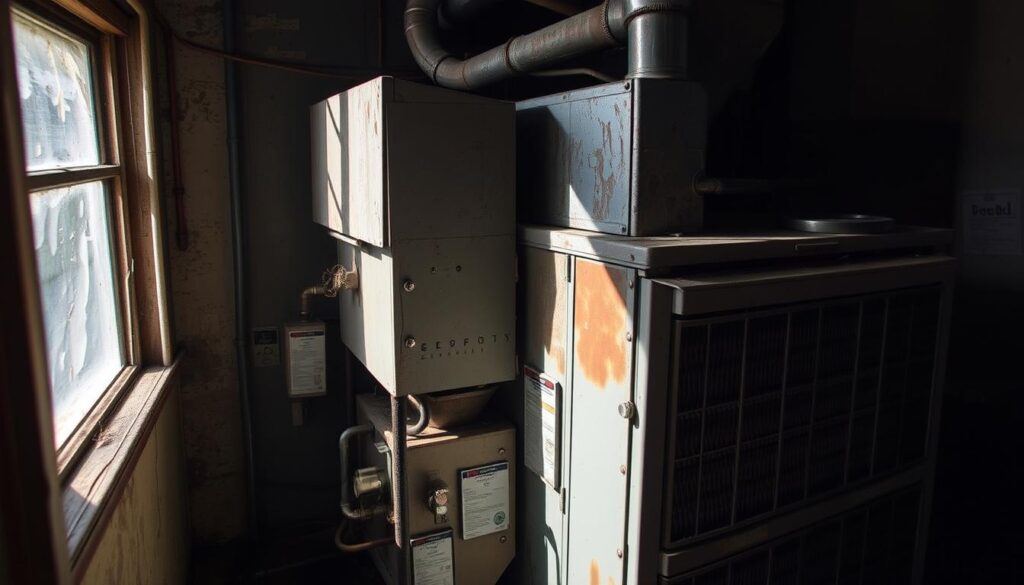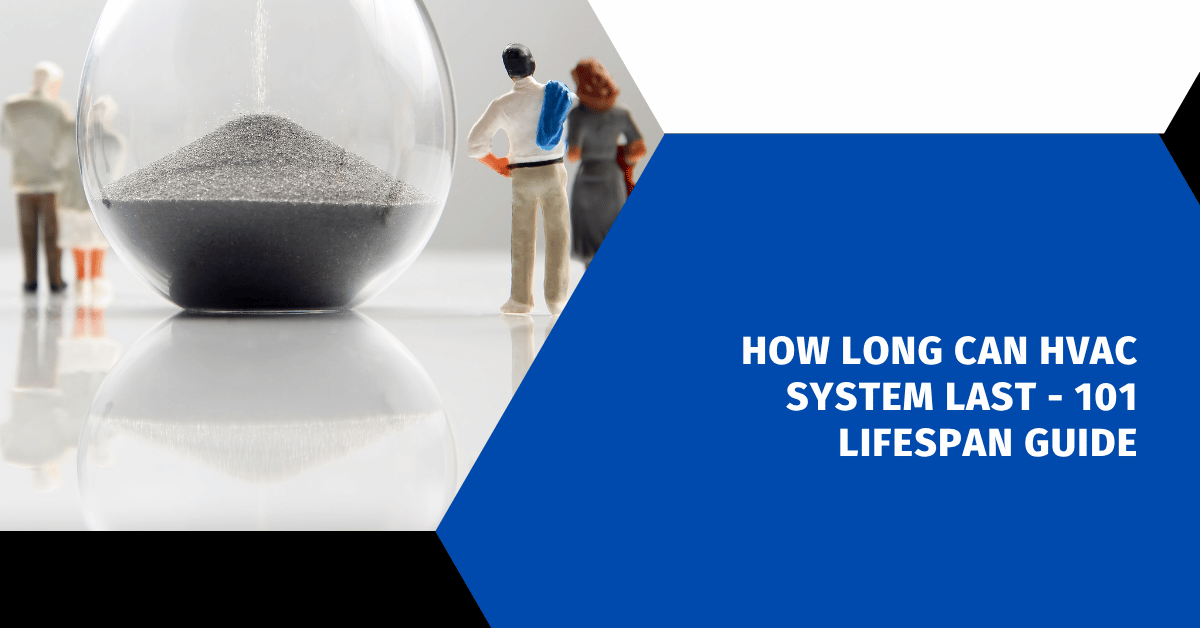Affiliate Disclosure
HVAC Guide Guys is a participant in the Amazon Services LLC Associates Program, an affiliate advertising program designed to provide a means for sites to earn advertising fees by advertising and linking to Amazon.
How Long Can HVAC System Last? Ever thought about how long your home’s HVAC system will keep you cozy? Knowing how long it might last helps you plan and budget. It also guides your decisions on maintenance and when to replace it.

The lifespan of an HVAC system can range from 15 to 25 years. The type of system and its parts affect how long it lasts. Your home’s environment, how well you maintain it, and how often you use it also matter.
Understanding your HVAC system’s lifespan helps you make smart choices. Regular upkeep, quick fixes, and knowing when something’s wrong can keep it running well longer. This way, you get the most out of your system.
Key Takeaways
- HVAC systems typically last 15 to 25 years
- Regular maintenance significantly extends system life
- Different HVAC types have varying longevity
- Environmental factors impact system durability
- Professional inspections are key for long-term performance
Table of Contents
Understanding HVAC System Basics and Components
Your home’s comfort relies on a complex network of heating, ventilation, and air conditioning (HVAC) systems. Knowing these systems is key to managing your hvac replacement timeline and keeping your system running well.
Modern HVAC systems are complex machines. They control indoor temperature, humidity, and air quality. They have several important parts that work together to make your home comfortable.
Key Components of Modern HVAC Systems
- Furnace or heat source
- Air conditioning unit
- Ductwork
- Thermostat
- Air handler
Different Types of HVAC Systems
| System Type | Average Lifespan | Energy Efficiency |
|---|---|---|
| Central Air Conditioning | 10-15 years | 14-16 SEER rating |
| Heat Pump | 10-15 years | Up to 20 SEER rating |
| Ductless Mini-Split | 20 years | Up to 30% energy savings |
How HVAC Systems Function
HVAC systems move heated or cooled air through your home via ducts. The thermostat acts as the brain, telling the system when to heat or cool. Knowing how they work helps homeowners make smart choices about upkeep and when to replace them.
Regular maintenance boosts your system’s performance and life. By getting professional checks and doing routine care, you can make your HVAC last longer and work better.
Explore Our HVAC Shop
Looking for top-rated HVAC tools, parts, and accessories? Visit our shop and find the perfect solution for your needs.
Visit the ShopAverage Lifespan Expectations for Different HVAC Types
Knowing how long your HVAC system will last is key for homeowners. It helps with planning and budgeting for the future. The lifespan of your HVAC depends on many things like how well it’s maintained, how it was installed, and the weather where you live.
How long your HVAC lasts can really make a difference. Here’s a look at the average lifespans for different types:
- Gas Furnaces: 20-25 years
- Air Conditioners: 15-20 years
- Heat Pumps: 10-20 years
- Boilers: 20-35 years
- Ductless Mini-Splits: 10-30 years
The lifespan of your system depends on a few important things:
- How well it was installed
- How often it’s maintained
- How much you use it
- The weather where you live
With good care, you can expect your system to last 15-20 years. But, if it’s not well taken care of, it might need to be replaced after just 10 years.
| HVAC System Type | Average Lifespan | Maintenance Impact |
|---|---|---|
| Gas Furnace | 20-25 years | High maintenance sensitivity |
| Air Conditioner | 15-20 years | Moderate maintenance needs |
| Heat Pump | 10-20 years | Frequent maintenance recommended |
Regular maintenance and knowing what your system needs can help it last longer. This also keeps it running better.
How Long Can HVAC System Last in Various Climates
Climate is key in how long your HVAC system lasts. Different weather conditions affect your heating and cooling system’s life. Knowing these differences helps you keep your system running well and spot problems early.
Your HVAC system’s life depends on the weather it faces. Different climates put different stresses on it, making it wear out faster.
Coastal Area Impact on HVAC Longevity
Coastal areas are tough on HVAC systems. The salty air and high humidity cut down on how long they last. In these places, HVAC systems usually last 7 to 12 years, less than in other climates.
- Salt corrosion makes metal parts wear out faster
- High moisture leads to rust and electrical problems
- Getting a professional check-up every year is a good idea
Desert Climate Considerations
Places like Arizona are very hot, which is hard on HVAC systems. The heat shortens their life to 12-15 years, less than in cooler climates.
| Climate Type | Average HVAC Lifespan | Key Challenges |
|---|---|---|
| Coastal | 7-12 years | Salt corrosion, high humidity |
| Desert | 12-15 years | Extreme heat, constant operation |
| Moderate | 15-20 years | Balanced environmental conditions |
Humid Environment Effects
Humid climates are hard on HVAC systems. The extra moisture can cause mold, lower efficiency, and damage parts. Regular upkeep is essential to avoid early breakdowns.
Proactive maintenance is your best defense against climate-related HVAC system deterioration.
Knowing how climate affects your HVAC system helps you keep it running longer. Adjusting your maintenance to fit your local weather is important for your system’s long life.
Explore Our HVAC Shop
Looking for top-rated HVAC tools, parts, and accessories? Visit our shop and find the perfect solution for your needs.
Visit the ShopCritical Factors Affecting HVAC System Durability

Knowing what affects your HVAC system’s life is vital for good planning. Several important factors decide how long your system will work well in your home.
When thinking about when to replace your HVAC, consider these main factors:
- Installation Quality: A good installation makes a big difference in how well your system works and lasts
- Maintenance frequency and thoroughness
- Environmental conditions around the unit
- How much you use it and how hard it works
- The quality of the equipment it came with
Your HVAC system’s life depends on many things working together. A bad installation can cut efficiency by up to 30%, shortening its expected 15-20 year life. Regular checks by pros can catch problems early.
Signs that your system might be in trouble include:
- Temperature not staying steady
- Using more energy than before
- Strange noises when it’s running
- Need for repairs too often
Good maintenance and watching your system closely are key to keeping it running well. Spending time and money on upkeep can make your system last longer.
Essential Maintenance Practices for Extended HVAC Life
Keeping your HVAC system in top shape is key to making it last longer. By following smart maintenance tips, you can keep your system running well. This helps you get the most out of your investment.
Regular Filter Replacement Schedule
Starting with regular filter care is a great way to keep your HVAC system going strong. It’s best to change filters every 90 days. If you have pets, you might need to do it every 60 days. This simple step:
- Improves the air quality
- Reduces stress on system parts
- Keeps dust and debris away
Professional Inspection Requirements
Getting your HVAC system checked by a pro once a year is a must. A certified technician can:
- Check the refrigerant levels
- Look over electrical connections
- Clean important system parts
- Spot early signs of wear
Seasonal Maintenance Tasks
Each season brings its own maintenance needs. Proactive care helps avoid sudden breakdowns and keeps your system running well:
- Spring: Clean the outdoor unit and check the refrigerant
- Summer: Make sure there’s good airflow and clean air filters
- Fall: Check the heating parts
- Winter: Lubricate moving parts and check insulation
By sticking to these maintenance steps, you can extend your HVAC system’s life. Instead of the usual 15-20 years, it could last even longer.
Explore Our HVAC Shop
Looking for top-rated HVAC tools, parts, and accessories? Visit our shop and find the perfect solution for your needs.
Visit the ShopSigns Your HVAC System Is Nearing End of Life

Knowing when your HVAC system is aging can prevent sudden failures and expensive fixes. Your HVAC system shows signs of aging through various indicators. These signs suggest it might be nearing the end of its life.
Look out for these important warning signs that your HVAC system is getting old:
- Increasing Energy Bills: Sudden spikes in utility costs often indicate declining system efficiency
- Frequent and expensive repairs becoming more common
- Inconsistent temperatures throughout your home
- Strange noises like grinding, squealing, or banging
- Unusual odors when the system operates
Specific performance red flags include:
- Hot and cold spots developing in different rooms
- Humidity control problems
- System running constantly but struggling to maintain comfortable temperatures
HVAC systems usually last between 10 to 20 years. After a decade, they often lose up to 50% of their original efficiency. When repair costs get close to half the price of a new system, it’s time to replace.
Pro tip: Track your system’s age and repair history to anticipate replacement needs before a complete failure occurs.
By spotting these signs early, you can plan ahead. This way, you avoid sudden disruptions to your comfort and budget.
Cost Considerations: Repair vs. Replace
Choosing between repairing or replacing your HVAC system is a big financial decision. To make the right choice, you need to look at several factors. This ensures you pick the most cost-effective option for your home.
The age and condition of your HVAC system are key to making a financial decision. Understanding the life cycle of your system helps you make a smart choice.
The $5,000 Rule for HVAC Replacement
Experts suggest a simple way to decide between repair and replacement:
- Multiply the repair cost by the system’s age
- If the total is over $5,000, replacing is usually better
- Think about the system’s current efficiency and performance
“When repair costs start approaching the price of a new system, it’s time to seriously consider replacement.” – HVAC Industry Expert
Energy Efficiency ROI Analysis
New HVAC systems save a lot of energy, which can help pay for the initial cost:
- New units have higher SEER ratings (up to 26)
- Energy bills can drop by 20-40%
- There might be tax credits for efficient installations
By looking at repair costs, system age, and energy savings, you can make a wise choice. This choice balances short-term costs with long-term savings.
Modern HVAC Technology and Lifespan Improvements
New technologies are changing how long HVAC systems last. They add smart features that make systems work better and last longer. Smart home tech and energy-saving innovations are key to this change.
Some big improvements include:
- Advanced sensor technologies that monitor system performance
- Predictive maintenance algorithms
- Variable-speed compressor designs
- Enhanced refrigerant management systems
Today’s HVAC systems use intelligent diagnostics to spot problems early. They check performance all the time. This lets homeowners fix small issues before they get big.
The new SEER2 standards, starting in January 2023, make units more efficient. This means they work better and last longer.
Companies are also using new materials and designs. This makes systems more durable. They can handle tougher weather conditions.
Investing in modern HVAC technology means investing in long-term home comfort and efficiency.
Explore Our HVAC Shop
Looking for top-rated HVAC tools, parts, and accessories? Visit our shop and find the perfect solution for your needs.
Visit the ShopCommon HVAC Problems That Reduce System Life
Your HVAC system’s life depends on solving key problems. These issues can shorten its lifespan. Knowing these factors helps avoid early failure and costly replacements.
Several major problems affect your HVAC’s performance and lifespan:
- Improper sizing puts too much strain on parts
- Bad installation lowers system efficiency
- Ignoring maintenance speeds up wear
- Extreme temperatures and humidity also play a role
Signs of an aging HVAC system include:
- Frequent breakdowns
- Higher energy bills
- Unstable temperatures
Problems that shorten HVAC life include:
- Refrigerant leaks stress the compressor
- Blocked air filters limit airflow
- Electrical issues
- Dirty or damaged coils
Preventive maintenance can add up to 33% to your system’s life. Regular checks, quick fixes, and clean filters are key. They keep your HVAC running well.
Proactive care is always more cost-effective than reactive replacement.
Conclusion
Knowing how long an HVAC system lasts is key for homeowners wanting comfort and energy savings. Your system can last 15 to 25 years with the right care. This depends on maintenance, installation quality, and the environment.
Being proactive is essential for a longer HVAC system life. Regular maintenance and professional checks can make a big difference. Watch for signs like high energy bills or uneven temperatures, which might mean it’s time for a new system.
Different parts of your HVAC system have different lifespans. Furnaces can last up to 30 years, and ductwork might last 25. But air conditioners usually only last 10 to 15 years. Quality installation, regular maintenance, and knowing your system’s condition can help it last longer and save you money.
Your HVAC system is a big investment in your home. Working with experts, understanding your system’s needs, and staying on top of maintenance are key. This way, you can enjoy comfort, performance, and save money in the long run.

